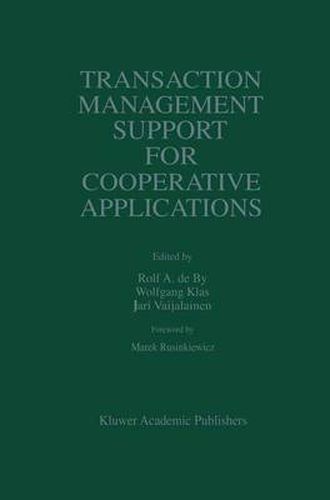Readings Newsletter
Become a Readings Member to make your shopping experience even easier.
Sign in or sign up for free!
You’re not far away from qualifying for FREE standard shipping within Australia
You’ve qualified for FREE standard shipping within Australia
The cart is loading…






This title is printed to order. This book may have been self-published. If so, we cannot guarantee the quality of the content. In the main most books will have gone through the editing process however some may not. We therefore suggest that you be aware of this before ordering this book. If in doubt check either the author or publisher’s details as we are unable to accept any returns unless they are faulty. Please contact us if you have any questions.
Transaction Management Support for Cooperative Application is a comprehensive report on a successful international project, called TRANSCOOP, carried out from 1994 to 1997 by a group of European scientists. But the book is also much more than that, namely, an ambitious attempt to integrate Computer-Supported Cooperative Work (CSCW), Workflow Management Systems (WFMS), and Transaction Processing (TP) technologies. The very term {\em cooperative transactions} is in itself contradictory. Cooperation technologies, such as CSCW, aim at providing a framework for information exchange between cooperating (human) participants. In contrast, traditional transaction technologies allow concurrent users to operate on shared data, while providing them with the illusion of complete isolation from each other. To overcome this contradiction, the TRANSCOOP researchers had to come up with a new and original notion of correctness of concurrent executions, based on controlled exchange of information between concurrent users. Merging histories in accordance with prespecified commutativity rules among concurrent operations provides transactional guarantees to activities such as cooperative designing, which until now had to be carried out sequentially. As an interesting consequence, it also provides a basis for management of consistency between disconnected or mobile users who operate independently and yet, must occasionally reconcile their work with each other.
$9.00 standard shipping within Australia
FREE standard shipping within Australia for orders over $100.00
Express & International shipping calculated at checkout
This title is printed to order. This book may have been self-published. If so, we cannot guarantee the quality of the content. In the main most books will have gone through the editing process however some may not. We therefore suggest that you be aware of this before ordering this book. If in doubt check either the author or publisher’s details as we are unable to accept any returns unless they are faulty. Please contact us if you have any questions.
Transaction Management Support for Cooperative Application is a comprehensive report on a successful international project, called TRANSCOOP, carried out from 1994 to 1997 by a group of European scientists. But the book is also much more than that, namely, an ambitious attempt to integrate Computer-Supported Cooperative Work (CSCW), Workflow Management Systems (WFMS), and Transaction Processing (TP) technologies. The very term {\em cooperative transactions} is in itself contradictory. Cooperation technologies, such as CSCW, aim at providing a framework for information exchange between cooperating (human) participants. In contrast, traditional transaction technologies allow concurrent users to operate on shared data, while providing them with the illusion of complete isolation from each other. To overcome this contradiction, the TRANSCOOP researchers had to come up with a new and original notion of correctness of concurrent executions, based on controlled exchange of information between concurrent users. Merging histories in accordance with prespecified commutativity rules among concurrent operations provides transactional guarantees to activities such as cooperative designing, which until now had to be carried out sequentially. As an interesting consequence, it also provides a basis for management of consistency between disconnected or mobile users who operate independently and yet, must occasionally reconcile their work with each other.